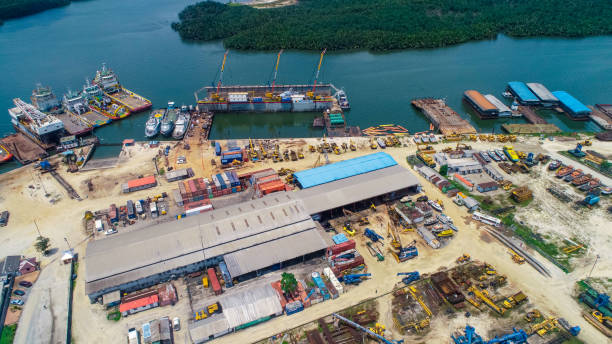In a bid to solidify its standing in the global export market, Nigeria has embarked on a strategic overhaul of its economic zones. The action aims to promote export diversification, increase productivity, and fortify regulatory control. The nation is home to more than 40 authorised free trade zones (FTZs), which serve as important centres for commerce, investment, and production. However, their contribution to Nigeria’s export growth has been hindered by underutilisation, regulatory gaps, and inefficiencies.
The Nigerian government hopes to improve these zones’ operational effectiveness, draw in foreign investment, and foster an atmosphere that encourages export-driven growth by strengthening control over them.
ECONOMIC ZONES AND THEIR ROLE IN EXPORT PROMOTION
The Function of Economic Zones in Promoting Exports Businesses can benefit from tax breaks, simplified rules, and specialised infrastructure in economic zones, especially FTZs. They are intended to promote industrial growth, ease commerce, and draw in foreign direct investment (FDI). FTZs provide Nigeria, a resource-rich nation, the chance to diversify its exports beyond crude oil, which now makes up more than 80% of its total export revenue.
Notable FTZs in Nigeria include the Kano Free Trade Zone, which promotes textiles and agro-processing, and the Lekki Free Zone in Lagos, which concentrates on industrial production and logistics. Many of these zones have failed to meet expectations despite their potential because of poor infrastructure and administration.
THE GOVERNMENT’S STRATEGY FOR STRENGTHENED MONITORING
The Nigerian Export Processing Zones Authority (NEPZA) and the Oil and Gas Free Zones Authority (OGFZA) have been directed to strengthen regulations and enhance oversight in recognition of these problems. The following are important facets of the government’s plan:
1. Policy Reforms and Standardisation: To guarantee uniformity and openness, the government is updating antiquated regulations pertaining to FTZs. This entails creating consistent rules for companies doing business in the zones and enacting sanctions for noncompliance.
2. Infrastructure Investment: Work is being done to improve port facilities connected to economic zones, electricity supplies, and road networks. For example, it is anticipated that the Lekki Deep Sea Port’s planned integration with the Lekki Free Zone will improve export logistics and shorten transit times.
3. Digitalization and Efficiency: The government aims to cut down on bureaucratic red tape and promote efficiency in the zones by using digital platforms for customs clearance, licensing, and monitoring.
4. Emphasis on Non-Oil Exports: To encourage non-oil exports, special incentives are being offered to sectors including manufacturing, textiles, and agriculture. In order to take advantage of Nigeria’s agricultural potential, agro-processing zones in particular are being given priority.
INTERNATIONAL COMPETITION AND NIGERIA’S LESSONS
Economic zones have been effectively employed by nations like China, India, and the United Arab Emirates (UAE) to promote manufacturing and export growth. For instance, the UAE’s Jebel Ali Free Zone (JAFZA), which contributes about 23% of Dubai’s GDP, is a prime example of operational efficiency.
By building in top-notch infrastructure, promoting public-private partnerships (PPPs) to fund and administer its zones, and taking a customer-centric stance to draw in investors, Nigeria might take inspiration from these success stories.
OBSTACLES TO SURMOUNT
There are still a number of obstacles in the way of the ambitious plans:
- Corruption and Governance Issues: Nigeria’s economic policies have historically been weakened by poor governance and corruption. For the reforms to be successful, accountability systems must be strengthened.
- Insufficient Funding: Without the participation of the private sector, the substantial capital investment needed to upgrade infrastructure in economic zones may put a strain on government finances.
- International Competition: Nigeria’s economic zones must contend with established FTZs in other nations, thus providing effective services and competitive incentives is crucial.
CONSEQUENCES FOR EXPORTERS
These reforms have the potential to make Nigeria’s economic zones thriving export hubs if they are successfully implemented. Exporters would gain from:
- Decreased Costs: Tax breaks and streamlined procedures would result in cheaper operating costs.
- Better Logistics: Faster and more dependable access to global markets would be made possible by upgraded infrastructure.
- Diverse Opportunities: Exporters in manufacturing, textiles, and agriculture would have new prospects as a result of increased attention being paid to non-oil sectors
IN CONCLUSION
Nigeria is committed to maximizing its enormous export potential, as seen by its attempts to strengthen control over its economic zones. These areas may become engines of economic diversification and international trade competitiveness by resolving long-standing inefficiencies, enhancing infrastructure, and creating a welcoming business climate.
READY TO MASTER EXPORTATION?
Take your export knowledge to the next level! Enroll in our 6-week online export training program at www.microvarsity.com/meta. Learn the strategies you need to navigate economic zones, seize global opportunities, and thrive as an export entrepreneur.
Your export success starts here—register today!

